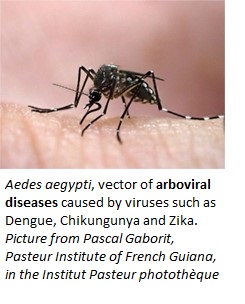Publication of a series of 11 papers with data on vectors that transmit vector-borne diseases is a significant advance in the availability of such data in an easy and open access format. Published by the journal GigaByte by GigaScience Press, in partnership with the Global Biodiversity Information Facility and supported by TDR, the papers improve knowledge on vectors and pave the way forward in data sharing.

Currently affecting about half of the world’s population, vector-borne diseases are transmitted by arthropod (insect and tick) vectors such as mosquitoes and flies; they include diseases such as malaria, dengue and leishmaniasis. While some diseases such as malaria show a decline in numbers of fatalities, others, such as those caused by arboviruses like dengue, chikungunya and Zika viruses, show a worrying increase in number of cases (although improved case management has led to a decrease in fatalities). Factors such as climate change and urbanization have the potential to further affect the impact of these diseases, so it is vital that research is ongoing to understand more about the vectors and to ensure that data are shared widely with researchers and policy-makers in an open access, freely available and discoverable format.
The special issue of GigaByte includes 11 papers from more than 150 authors sharing data relating to the presence, diversity, ecology, bionomics and geographic spread of vectors that carry and transmit viruses, bacteria and parasites to humans and animals. Data are shared on triatomes, sand flies, mosquitoes and ticks, collected from Europe as well as the Americas. For example, one study presents data on nearly half a million ticks collected across the United States of America.
 The Global Biodiversity Information Facility (GBIF), the platform via which the data are shared, is an international network and data infrastructure funded by the world's governments that aims to provide “anyone, anywhere, open access to data about all types of life on Earth“. However, one of the barriers to research is that scientists do not always think about sharing their data through platforms such as the GBIF.org. GBIF’s Deputy Director, Tim Hirsch, commented: “The great response to this data paper series shows the enormous potential for improved availability of data on species connected with human diseases. Such data often already exists but are disconnected and unavailable for re-use: opening it up through sharing via platforms such as GBIF, and alerting the scientific community via peer-reviewed descriptions, supports better understanding and policies reflecting the inextricable connections between biodiversity and human health.”
The Global Biodiversity Information Facility (GBIF), the platform via which the data are shared, is an international network and data infrastructure funded by the world's governments that aims to provide “anyone, anywhere, open access to data about all types of life on Earth“. However, one of the barriers to research is that scientists do not always think about sharing their data through platforms such as the GBIF.org. GBIF’s Deputy Director, Tim Hirsch, commented: “The great response to this data paper series shows the enormous potential for improved availability of data on species connected with human diseases. Such data often already exists but are disconnected and unavailable for re-use: opening it up through sharing via platforms such as GBIF, and alerting the scientific community via peer-reviewed descriptions, supports better understanding and policies reflecting the inextricable connections between biodiversity and human health.”
Describing TDR’s support for the publication and its potential impact, Dr Florence Fouque, Scientist and focal point for vectors at TDR, stated: “This is an important effort for sharing data on vectors which are essential in the fight against vector-borne diseases,” adding “not only does this publication provide relevant data to researchers and decision-makers, but we believe that such publication will incentivise data sharing on vectors and that scientists collecting the data around the world will see recognition for the work and usefulness of sharing their own research data”. Such papers also drive readers directly to the data and improve findability through well-established mechanisms for article discovery. TDR is currently planning to support another special issue like this one.
See all the papers in the series here: https://doi.org/10.46471/GIGABYTE_SERIES_0002
For more information about the papers, please contact Dr Florence Fouque

